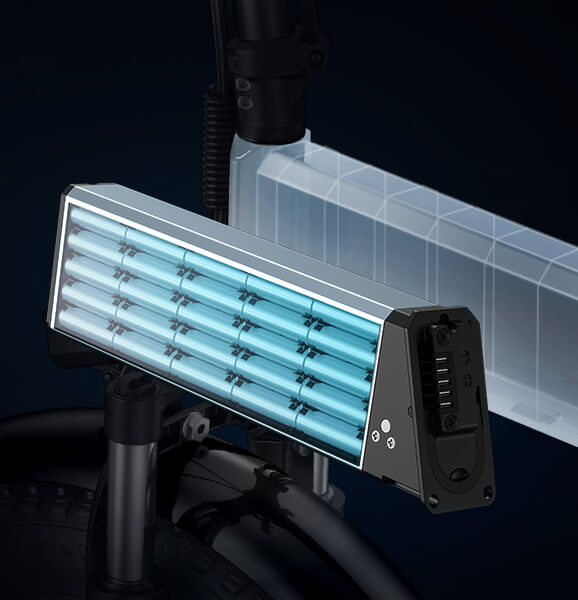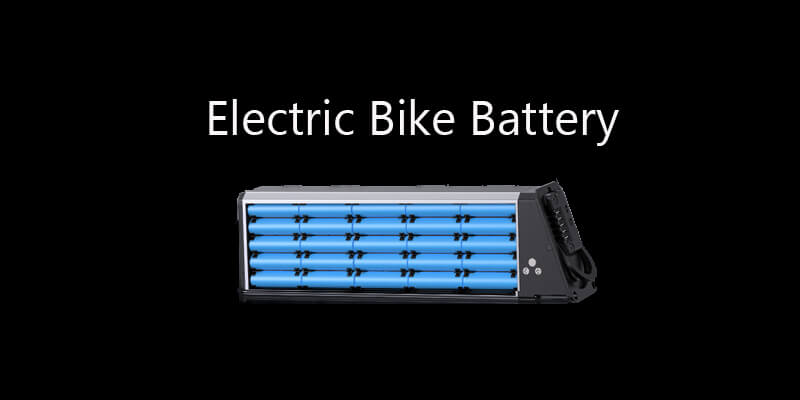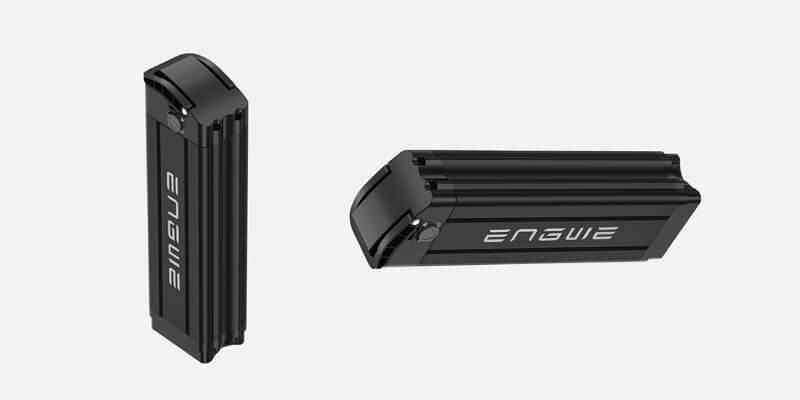At the heart of every electric bike lies the one piece that has the greatest impact on speed, distance, and overall performance - the battery. Every part of the electric bike riding experience is impacted by the battery. Understanding the impact of your e-bike's battery can significantly enhance your riding experience. Finding the right battery for an electric bike is something often overlooked by new riders. However, it is one of the most important things to consider when comparing electric bikes. At Engwe Bikes we offer a range of e-bikes and accessories designed to help you get the most out of your ride, including pulling the best power possible with the best battery setup. Here is what you need to know about batteries for electric bikes!

Understanding E-Bike Batteries to Find the Right Battery for an Electric Bike
E-bikes commonly utilize Lithium-ion (Li-ion) batteries for their high energy density and long life span. Common battery options include Li-ion's lighter weight and longer range versus NiMH's environmental friendliness but heavier weight. There is a unique balance play going on with electric bikes between durable and powerful batteries and the need to stay as sleek and lightweight as possible. E-bike batteries are designed to be as compact and light as possible to not affect the rest of the bike's performance. Finding the right battery for your new e-bike is crucial to ensuring it can meet your needs and perform as you need it to day in and day out.
Choosing the Right Battery for Your Electric Bike
When considering the optimal battery setup for your new electric bike, delving into the specifics can significantly enhance your riding experience. The power source of your e-bike, the battery, is pivotal in determining how your bike performs under various conditions. Here's a deeper look into the factors you should consider:
1. Capacity, Voltage, and Watt-hours
- Capacity: A higher capacity for an e-bike battery means it can power the bike for longer periods between recharges.
- Voltage: A higher voltage delivers more power to the e-bike's motor, enhancing its ability to accelerate and tackle steep inclines.
- Watt-hours: This figure gives an idea of how long they can expect their bike to go on a single charge under normal circumstances.
2. Compatibility of Battery and Bike Setup
The battery must be compatible with your e-bike in more ways than one. Some points to think about as you compare e-bikes and battery setups include:
- Physical Fit: The battery should physically integrate with your e-bike's design without adding awkward bulk or hindering the bike's aesthetic appeal.
- Electrical Compatibility: The battery's voltage and type should match the e-bike's motor specifications to avoid performance issues or potential damage.
- Lifestyle Needs: Are you a casual rider or a daily commute rider - those factors will greatly impact what kind of power and battery life you need for your bike.
3. Weight and Placement of the Battery
- Weight: Heavier electric bike batteries can provide more power and longer range, but they also add to the overall weight of the e-bike.
- Placement: Where the battery is mounted on the e-bike can impact its handling and balance if it's far front or far rear in placement.
When looking for the best electric bike battery setup, it is important to keep all of these factors in mind. Just as there are many makes and models and designs of bikes, there are many types of electric bike batteries to consider. Each has pros and cons and some are better suited for certain situations and uses than others. Let's consider a few more things to look at as you choose the best battery for an electric bike!

Comparing Battery Brands and Models
With numerous advancements in battery technology, many brands now offer sophisticated solutions tailored to different needs:
- Brand Reputation: Established brands are known for their reliability and performance, offering warranties and extensive support networks.
- Technology and Features: Some batteries come with smart features for real-time monitoring and security, or fast-charging capabilities.
- Form Factor: The shape and size of the battery affect how it integrates with the e-bike as some are small and sleek and others can be a bit bulky.
Considering these factors in depth will help you choose a battery that not only meets your e-bike's technical requirements but also suits your personal preferences and riding style. This includes finding electric bike battery accessories and other features that can enhance your e-bike's performance. Whether it's extended range, robust power, or convenience and portability, understanding these aspects ensures you find the perfect power setup for your electric bike adventure.
Maximizing Battery Life and Performance
Like any other battery pack, e bike batteries need to be used properly and taken care with good maintenance. Doing so will extend their lifespan and also ensure they work as effectively as possible. When you finally find the best battery for an electric bike, you need to treat it like you would the battery or any other component of your vehicle. Whether it is 36v e bike batteries, advanced 48v battery e-bike setups, or something on the higher or lower end, one truth remains. Electric bike batteries and components have to be maintained. And here's how:
- Charging Practices: Proper charging habits, such as not leaving the battery plugged in for extended periods and not running it completely dead all the time, can significantly extend its lifespan.
- Maintenance Tips: Regular cleaning and avoiding extreme temperatures during storage can keep the battery in top condition and prevent wear and tear from corrosion and pollutants in the air.
- Troubleshooting Issues: Understanding common issues, like decreased range or slow charging, can help you address problems more effectively and when to call in the professionals for an inspection and repair job.
- Safety Tips: Handle and store batteries with care to prevent damage or accidents, such as avoiding exposure to water and extreme heat and not storing them around chemicals or other batteries.
- Regulations and Standards: Familiarize yourself with local and international regulations for electric bike battery use, especially regarding transportation (e.g., airline travel) and disposal, to ensure compliance.

The Future of Electric Bike Batteries
Advancements in battery technology, including solid-state batteries and improved charging methods, promise to enhance future e-bikes' performance, range, and sustainability. Technology continues to advance and improve battery options. In time standards for electric bike battery 48v and electric bike battery 36v systems, as well as others will improve. Bikes will get sleeker, faster, and safer. And it all ties back to the power supply and the battery system utilized in the e-bikes of the future. Selecting the right battery and maintaining it diligently is key to unlocking the best e-bike experience, both today and down the road. Investing in quality batteries and adhering to recommended care practices ensures that your e-bike remains a reliable and enjoyable mode of transportation.
Final Thoughts on Finding the Right Battery for an Electric Bike
Have you had an interesting experience or handy tip regarding e-bike batteries? Share your insights in the comments below. For more essential guides on e-bike maintenance and upgrades, consider subscribing or following us. Let's keep the wheels turning and the adventures rolling! If you have any questions about e-bikes, batteries for e-bikes, or are ready to purchase your first electric bike, or would like to purchase an extra battery for an electric bike (Engwe e-bike), our friendly and knowledgeable team of experts here at Engwe Bikes is ready to help.
You may also want to know:
Explore More About Men's Electric Bike
Best Fast Electric Bikes in UK (Within Max Speed Limits)
Best Cheap Electric Bikes in UK for 2024